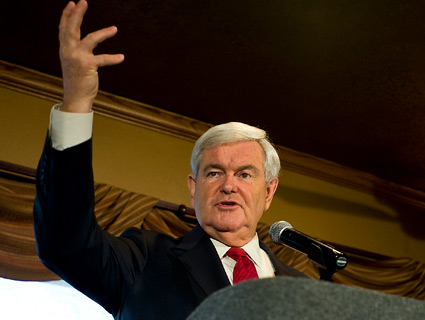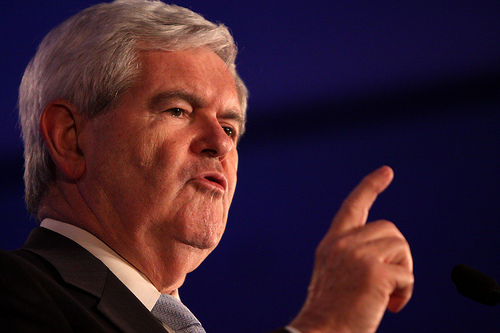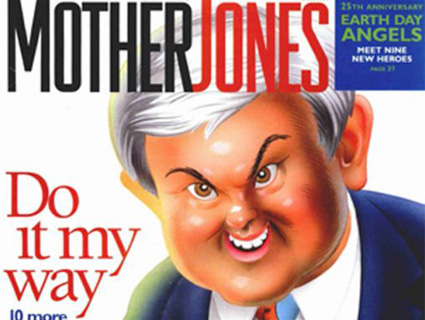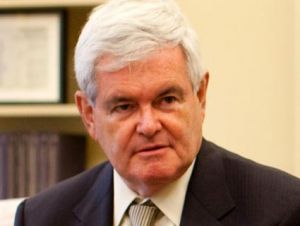
Former House Speaker Newt GingrichBrian Cahn/ZUMA Press
As Newt Gingrich looks to complete his improbable political comeback, his opponents won’t let him (or the electorate) forget about the scandal that ended the first act of his political career—a string of 84 ethics complaints in the House that culminated in a $300,000 sanction. The pro-Romney super-PAC Restore Our Future hammered home the message in a recent Iowa television ad, citing the fine as evidence that “Newt has a ton of baggage.”
The former speaker of the House has a handy response for those taking aim at his past. “All of the substantive issues, we were ultimately told we were right,” Gingrich told the Des Moines Register editorial board on Thursday. “It’s truly one of the most frustrating things of my career.” He blamed his congressional downfall on bad lawyering and on the zealotry of the House ethics committee (although half of the members were Republican).
Lost in the campaign trail barbs about Gingrich’s ethical lapses, however, is any sense of what Gingrich actually did, either allegedly or as a matter of record. In short, he used a network of consulting firms, educational institutions, and even a charity for inner-city teens to promote a set of clearly partisan political goals designed to sweep Republicans into power in Washington. Gingrich’s web of interconnected organizations formed the early prototype for the multimillion-dollar public and private network he established after leaving public office, known now as “Newt Inc.”
Here’s how it worked:
Step 1: The Vehicle. Gingrich’s political machine took advantage of a number of institutions that actually predated his congressional tenure, the most significant of which which was GOPAC, a political action committee founded by former Delaware Gov. Pierre S. du Pont. GOPAC had not distinguished itself particularly in its early years, but things began to change in 1986 when Gingrich, an ambitious back-bench congressman from Georgia, took control of the group. He instilled in it a sense of purpose—namely, his vision of a Republican majority in Washington by 1996. GOPAC, in turn, became a fundraising machine, raking in $15 million on Gingrich’s watch. As Connie Bruck later reported in The New Yorker, it also skirted Federal Election Commission disclosure requirements by distributing fundraising dollars without ever actually handling the money itself. In some cases, it effectively served as a matchmaker, pairing candidates with like-minded donors.
The committee’s plan was to change the very language of politics and recast the terms of the debate entirely; Gingrich would, like the professor he once was, educate rising conservative politicians to “speak like Newt.” One way to do that was to issue buzzword-packed cassette tapes to aspiring Republican lawmakers.
The other method Gingrich conceived of was to hold nationally televised seminars. In 1990, he developed a program, the American Opportunities Workshop, in which he offered his—and by extension, GOPAC’s—vision for the future and outlined steps to organize activists on cable television. Gingrich specifically avoided linking the program to the Republican Party by name, lest he scare off political novices. But winning elections was, by all accounts, the intent. As the House ethics committee noted in 1997, “While the program was educational, the citizens’ movement was also considered a tool to recruit non-voters and people who were apolitical to the Republican Party.”
Step 2: The Shell Charity. Running a national political movement without the formal backing of the party was resource intensive. So to save money, Gingrich and his allies tried something new. They replaced the American Opportunities Workshop with an almost identical program with a different name, American Citizens’ Television. And they turned over the operations to the Abraham Lincoln Opportunity Foundation (ALOF), a tiny Denver-based charity founded and controlled by GOPAC ally Bo Callaway, a former Colorado congressman and Army secretary.
According to papers filed with the IRS in 1984, ALOF was designed to instill a sense of civic virtue in inner-city kids by sponsoring “Land of Opportunity Speaking Competition Contests” in Colorado public schools. The charity’s leadership was nearly identical to the leadership of the Colorado Republican Party (in fact, it was the state GOP that had come up with the idea for the contest in the first place).
If the contest helped nudge teenagers toward the Republican party and further the GOP’s minority-outreach efforts, well, that was all well and good; the first winner, a Vietnamese immigrant, earned a $2,500 scholarship and delivered the opening Pledge of Allegiance at the 1984 Republican National Convention.
By 1987, Colorado Republicans had lost interest in speech competitions, the contests had stopped, and ALOF had gone dormant. It had just $486.08 in its bank account—but it did have one thing of much greater value: 501(c)(3) status from the IRS, meaning all donations to the group were tax exempt. Control of the charity remained in the hands of Callaway.
Step 3: Doubling Your Money. Gingrich brought the Abraham Lincoln Opportunity Foundation back to life in 1990—albeit in a dramatically different role. Instead of fostering a love of capitalism and civic virtues in inner-city kids, it was paying for Gingrich to teach conservative activists how to elect Republicans. Internal memos placed a premium on airing the program in specific congressional districts.
The strategy was clear—by giving money to a tax-exempt organization, donors could effectively double their buying power because they could write it all off as a tax deduction (meaning it was that much less they had to pay to Uncle Sam). Not that there was much of a difference between ALOF and GOPAC. It was a matter of paperwork and little else; the two organizations shared a DC office, and many of the same employees. They even shared money—while the Abraham Lincoln Opportunity Foundation was nominally operating Gingrich’s television program, GOPAC loaned the group $45,000; the Los Angeles Times reported that in 1990, GOPAC donors gave the former inner-city charity at least $150,000.
Ultimately, the IRS caught wind of the arrangement and stepped in, ruling that as an educational nonprofit, ALOF couldn’t finance a purely political enterprise. In 1990, the final episode of the program was produced instead by a third conservative group, Citizens Against Government Waste—which, while not technically affiliated with Gingrich, was a major donor to his enterprises.
With the IRS’s ruling, ALOF’s new role was more or less dead. But it continued to beat on, at least for a few years, as a conduit between donors and GOPAC. Because ALOF owed GOPAC money, Callaway offered donors the option of giving to ALOF instead, thereby shoring up the group’s finances and taking advantage of its tax status. Citizens Against Government Waste gave $37,000 to ALOF in 1991, and ALOF cut a check for $37,000 to GOPAC later that day. The ethics committee report noted that in addition to Callaway, “Two other GOPAC Charter Members made contributions to ALOF which were immediately turned over to GOPAC.”
Step 4: The College Course. With ALOF relegated to the background, Gingrich once again devised an elaborate funding and control mechanism to organize conservatives. This time, GOPAC would craft and develop a message of civilizational drift that would propel his party to victory; the corrupt welfare state was steering the United States away from the values that had made it great. But to cut costs (and skirt tax laws), he’d recruit outside groups to handle the fundraising and operations.
Gingrich unveiled a new television program, “Renewing American Civilization,” and found a willing host in Georgia’s Kennesaw State College, which offered to make it a four-credit course. Publicly, the goals were strictly educational; privately, it was a partisan mobilization drive. As Gingrich wrote in a letter, “Our hope is to have at least 50,000 individuals taking the class this fall and to have trained 200,000 knowledgeable citizen activists by 1996 who will support the principles and goals we have set.”
You didn’t need to work at GOPAC to see the real aims of the course. Gingrich was rebuked by many of the same scholars he claimed had helped devise the course. Boston College professor James Q. Wilson, whom Gingrich touted as an adviser to the course, actually repudiated the program after initially coming on board. According to one letter obtained by the ethics panel, the famed academic scolded the speaker for the clearly partisan tone of his lesson plan: “If this is not to be a course but instead a sermon, then you should get a preacher to comment on it.”
Larry Sabato, a University of Virginia political scientist whom Gingrich had also touted as a contributor to the course, soured on the experiment as well. In a 1996 book, he called the course “a partisan organizing tool.”
It was an odd public-private partnership. Kennesaw State provided classroom space to Gingrich and gave out course credits to students who participated in the class, but it relied on a third-party called the Washington Policy Group to manage and raise funds. All of that would be pretty innocuous, except GOPAC was the Washington Policy Group’s only client, and its staff consisted of three GOPAC vets. Gingrich promoted the entire operation in floor speeches.
Step 5: Public to Private. When a new Georgia state law explicitly prohibited public universities from sponsoring elected officials as teachers, Gingrich found a new home for Renewing American Civilization but kept the operation intact. GOPAC continued to supply the message, and Gingrich continued to deliver it. He simply moved the course from Kennesaw State to tiny Reinhardt College. And in place of the Washington Policy Group, Reinhardt outsourced fundraising for the course to a small group called the Progress & Freedom Foundation.
Like WPG, its staff overlapped GOPAC’s, and its ties to Gingrich ran deep. As the Washington Post reported, much of the $900,000 the group raised came from Gingrich donors.
Step 6: Sanctions. In 1997, Gingrich was ultimately slapped with a $300,000 fine by the House ethics committee for his “reckless” or “intentional” use of nonprofits for partisan political ends, and for misleading the House by offering conflicting account about GOPAC’s role in all of it (for which he blamed his lawyer). Although the sanction was tied to the specific violation of providing misleading information, he wasn’t exactly absolved of other wrongdoing. In some cases, the committee decided not to pursue a matter any further simply because he had stopped the unethical activity that had gotten him in trouble in the first place; for other charges (such as the use of official resources for his own nonprofits, Gingrich received letters of admonition). That same year, Abraham Lincoln Opportunity was stripped of its nonprofit status by the IRS, only to have it restored again six years later in a decision that raised eyebrows among campaign finance watchdogs.
Whether or not Gingrich technically broke House rules, his makeshift fundraising network was undeniably shady. He gladly appropriated a tax-exempt organization aimed at helping inner-city kids and used it to finance his goal of winning control of the House of Representatives. He likewise took two nonprofit educational institutions and used them to host a college course whose partisan aims he happily gushed about in private correspondence, and whose high-profile advisers actually repudiated it.
At a campaign stop in New Hampshire in November, Gingrich promised that if elected, he would teach an online class to the American people. The course, he said, would be free to the public. If the past is any indication, the real questions is: What’s the real motive—and who’s footing the bill?















